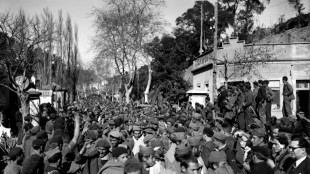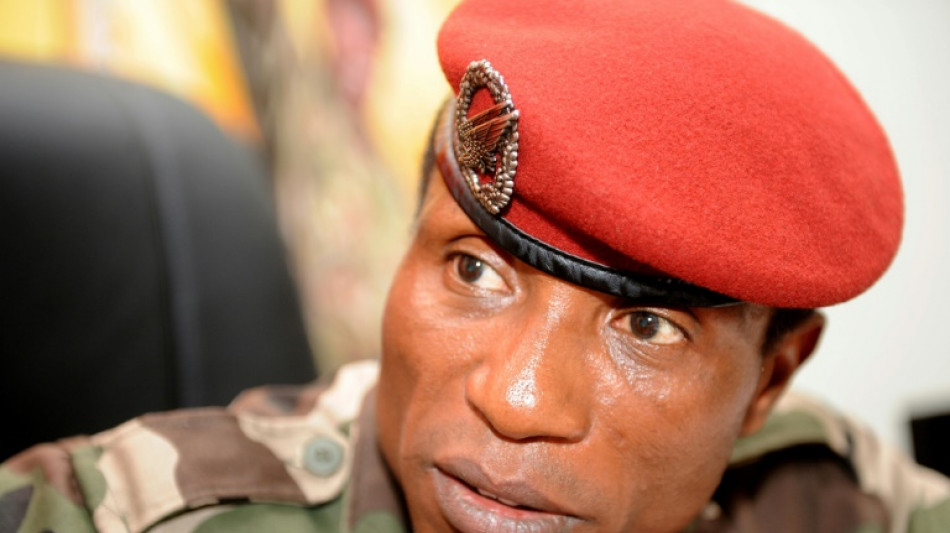
-
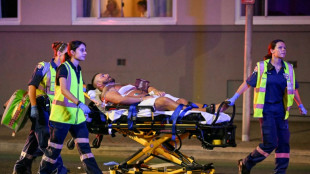 Gunmen kill 11 at Jewish festival on Australia's Bondi Beach
Gunmen kill 11 at Jewish festival on Australia's Bondi Beach
-
Zelensky says will seek US support to freeze front line at Berlin talks
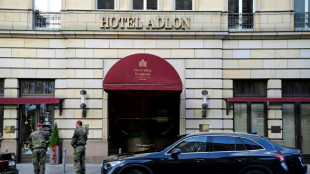
-
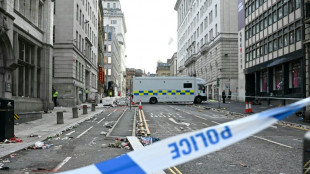 Man who ploughed car into Liverpool football parade to be sentenced
Man who ploughed car into Liverpool football parade to be sentenced
-
Wonder bunker shot gives Schaper first European Tour victory

-
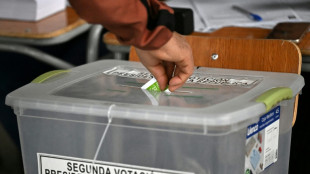 Chile far right eyes comeback as presidential vote opens
Chile far right eyes comeback as presidential vote opens
-
Gunmen kill 11 during Jewish event at Sydney's Bondi Beach
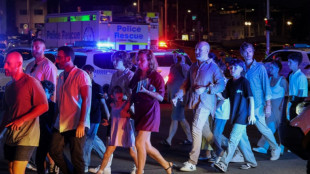
-
 Robinson wins super-G, Vonn 4th as returning Shiffrin fails to finish
Robinson wins super-G, Vonn 4th as returning Shiffrin fails to finish
-
France's Bardella slams 'hypocrisy' over return of brothels
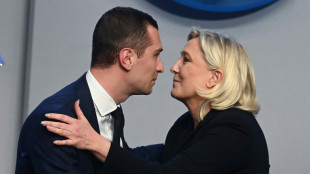
-
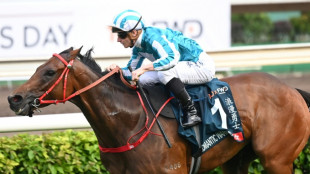 Ka Ying Rising hits sweet 16 as Romantic Warrior makes Hong Kong history
Ka Ying Rising hits sweet 16 as Romantic Warrior makes Hong Kong history
-
Shooting at Australia's Bondi Beach kills nine
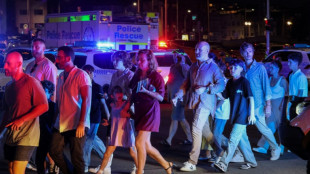
-
 Meillard leads after first run in Val d'Isere slalom
Meillard leads after first run in Val d'Isere slalom
-
Thailand confirms first civilian killed in week of Cambodia fighting
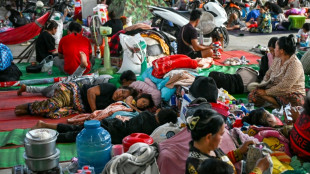
-
 England's Ashes hopes hang by a thread as 'Bazball' backfires
England's Ashes hopes hang by a thread as 'Bazball' backfires
-
Police hunt gunman who killed two at US university
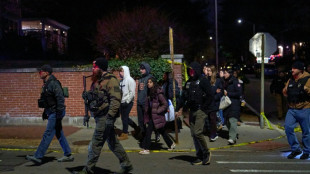
-
 Wemby shines on comeback as Spurs stun Thunder, Knicks down Magic
Wemby shines on comeback as Spurs stun Thunder, Knicks down Magic
-
McCullum admits England have been 'nowhere near' their best
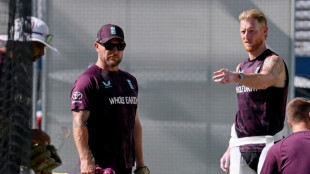
-
 Wembanyama stars as Spurs stun Thunder to reach NBA Cup final
Wembanyama stars as Spurs stun Thunder to reach NBA Cup final
-
Cambodia-Thailand border clashes enter second week
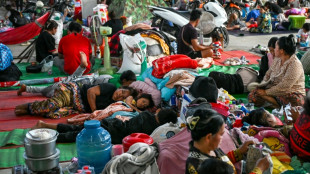
-
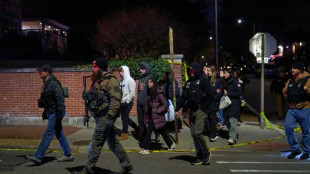 Gunman kills two, wounds nine at US university
Gunman kills two, wounds nine at US university
-
Green says no complacency as Australia aim to seal Ashes in Adelaide

-
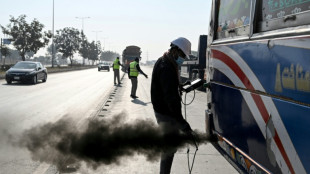 Islamabad puts drivers on notice as smog crisis worsens
Islamabad puts drivers on notice as smog crisis worsens
-
Higa becomes first Japanese golfer to win Asian Tour order of merit
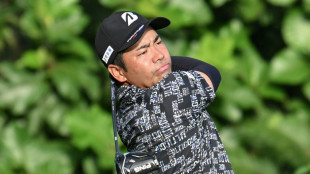
-
 Tokyo-bound United plane returns to Washington after engine fails
Tokyo-bound United plane returns to Washington after engine fails
-
Deja vu? Trump accused of economic denial and physical decline

-
 Vietnam's 'Sorrow of War' sells out after viral controversy
Vietnam's 'Sorrow of War' sells out after viral controversy
-
China's smaller manufacturers look to catch the automation wave
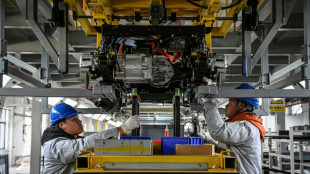
-
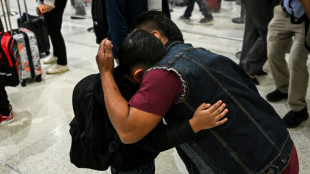 For children of deported parents, lonely journeys to a new home
For children of deported parents, lonely journeys to a new home
-
Hungary winemakers fear disease may 'wipe out' industry

-
 Chile picks new president with far right candidate the front-runner
Chile picks new president with far right candidate the front-runner
-
German defence giants battle over military spending ramp-up

-
 Knicks reach NBA Cup final as Brunson sinks Magic
Knicks reach NBA Cup final as Brunson sinks Magic
-
Quarterback Mendoza wins Heisman as US top college football player

-
 Knicks reach NBA Cup final with 132-120 win over Magic
Knicks reach NBA Cup final with 132-120 win over Magic
-
Campaigning starts in Central African Republic quadruple election
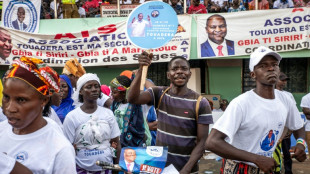
-
 NBA Cavs center Mobley out 2-4 weeks with left calf strain
NBA Cavs center Mobley out 2-4 weeks with left calf strain
-
Tokyo-bound United flight returns to Dulles airport after engine fails
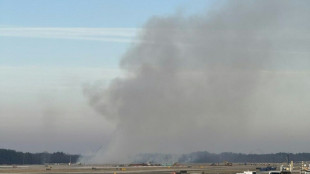
-
 Hawks guard Young poised to resume practice after knee sprain
Hawks guard Young poised to resume practice after knee sprain
-
Salah back in Liverpool fold as Arsenal grab last-gasp win

-
 Raphinha extends Barca's Liga lead, Atletico bounce back
Raphinha extends Barca's Liga lead, Atletico bounce back
-
Glasgow comeback upends Toulouse on Dupont's first start since injury

-
 Two own goals save Arsenal blushes against Wolves
Two own goals save Arsenal blushes against Wolves
-
'Quality' teens Ndjantou, Mbaye star as PSG beat Metz to go top

-
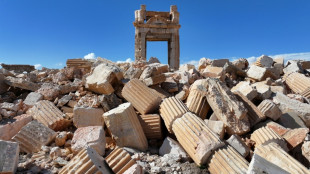 Trump vows revenge after troops in Syria killed in alleged IS ambush
Trump vows revenge after troops in Syria killed in alleged IS ambush
-
Maresca bemoans 'worst 48 hours at Chelsea' after lack of support
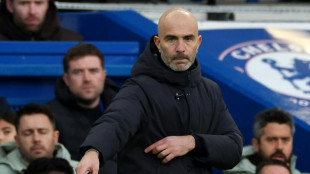
-
 Teenage pair Ndjantou, Mbaye star as PSG beat Metz to go top
Teenage pair Ndjantou, Mbaye star as PSG beat Metz to go top
-
Drone strike in southern Sudan kills 6 UN peacekeepers
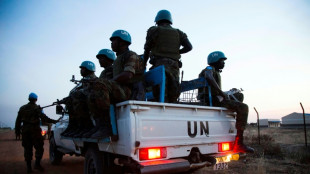
-
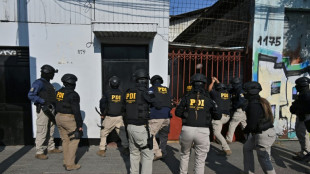 Crime wave propels hard-right candidate toward Chilean presidency
Crime wave propels hard-right candidate toward Chilean presidency
-
Terrific Terrier backheel helps lift Leverkusen back to fourth

-
 'Magic' Jalibert guides Bordeaux-Begles past Scarlets
'Magic' Jalibert guides Bordeaux-Begles past Scarlets
-
Teenage pair Ndjantou and Mbaye star as PSG beat Metz to go top


The bloodied trajectory of Guinean ex-dictator Dadis Camara
Moussa Dadis Camara once described himself as the "little captain who became president by destiny" but is associated with one of the darkest periods in Guinea's history.
Known during his rule for his absurd television performances in which he would humiliate stooges, the once-obscure officer who became an incongruous head of state is now a convicted criminal, 59, and faces 20 years in jail.
On September 28, 2009 and in the following days, the Red Berets of his presidential guard as well as soldiers, police and militiamen assassinated 156 people who had gathered in and around a stadium for an opposition rally ahead of an upcoming presidential election.
At least 109 women were raped.
Dadis Camara, then a military captain, had seized power with a group of officers in December 2008 immediately after the death of Lansana Conte, Guinea's second post-independence president who had ruled autocratically for 24 years.
He described the takeover as bloodless and emerged as head of a ruling junta, justifying his power grab by claiming no civilian could manage a country marked by corruption and instability since independence from France in 1958.
"I am the father of the nation," he declared in 2009, asserting on several occasions that he had been "chosen by God, who confers power on whomever He wishes".
The ex-dictator remained motionless as the verdict was read out on Wednesday at the Conakry Court, where he was sentenced for crimes against humanity, after the landmark trial. Seven other defendants were handed sentences of up to life imprisonment.
- The 'Dadis Show' -
Dadis Camara's rollercoaster life journey saw him rise from humble beginnings as a low-ranking officer born in a remote corner of southeastern Guinea, far from the centre of political power in Conakry.
He said his illiterate father was a simple peasant.
"I'm a man of the people... I was born in a hut," he once said.
He is known to have joined the armed forces in 1990 and to have served mainly in the army's fuel supply department.
In 2007 he was among army officers who took part in a wave of unrest against the regime of veteran president Conte, aimed notably at gaining payment of salary arrears.
His popular rhetoric earned him the support of many Guineans at the start of his presidency as he often highlighted his modest origins.
Then-Senegalese president Abdoulaye Wade said Dadis Camara gave him the impression of being a "pure young person who wants to do well".
In his frequent appearances on national television, which became known as the "Dadis Show", he would rail against fellow officers, accusing them of systematic corruption.
But he soon showed signs of letting his power go to his head, becoming increasingly erratic and reneging on a promise not to run in a presidential election the junta promised to hold in 2010.
- 'Napoleon' -
That led to the fateful day in Conakry's sports stadium in September 2009, where a large crowd of opposition supporters were attending a rally against Dadis Camara as a potential election candidate.
After the event, which turned most Guineans against him, Dadis Camara expressed little remorse, stating that his army was "uncontrollable", but that it also had "feelings and respect" for him.
He was unceremoniously ousted from power after suffering a head wound in an attempted assassination by his aide de camp in December 2009, formally giving up power in January 2010.
He received treatment in Morocco before fleeing into exile in Burkina Faso, where he converted to Christianity.
After announcing his intention to run for president in 2015, he was indicted in July 2015 by Guinean magistrates for his role in the stadium massacre.
He finally returned to his homeland in September 2022 for his trial, the once mighty head of state humbled by the experience of imprisonment.
In his winding testimony referencing philosophers Heraclitus and Immanuel Kant, Egyptian pharaohs, Napoleon and the memory of his father, Dadis Camara denied any responsibility.
"Many may think, 'Ah, Dadis Camara is crazy'", he said.
"Dadis Camara is not crazy -- Dadis Camara is generous because Dadis Camara recognises his ancestors."
A.Jones--AMWN


